| Introduction |
This is our first news of 2019 so we hope you all enjoyed a good break and wish you all a peaceful, productive and enjoyable year ahead. We’re now in the last six months of funding from the Bill & Melinda Gates Foundation. Our N2Africa teams in Ethiopia, Ghana, Nigeria, Tanzania and Uganda have been very busy conducting a large survey to understand the outcomes and impacts of the programme. ...
|
1 |
| NoduMax production and sales |
|
During the 2018 rainy season, about 7.2 tons of NoduMax inoculant was distributed in seven countries; namely, Benin, Burkina Faso, Cameroon, Ghana, Mozambique, Nigeria, and Togo. The product has been successfully registered in Nigeria and partially in Ghana. ...
Photo: A 300 ha field of soyabean inoculated with NoduMax at Kaboji, Niger
|
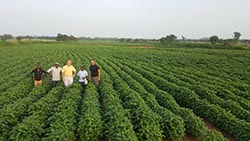 |
|
2 |
| New soybean inoculant registration stems from collaboration between N2Africa and Rizobacter |
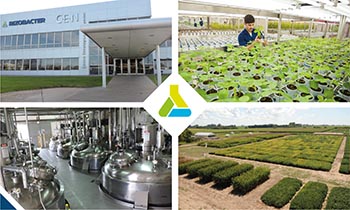 |
Rizoliq Soy, a liquid rhizobia inoculant for soybean with the highest quality standards recently gained approval by local authorities to be commercialized in Tanzania. Behind this achievement is a recent public-private partnership between Rizobacter and IITA Tanzania, mediated by N2Africa. ... |
|
3 |
| Inoculant production and use in Zimbabwe for the last five years |
|
Zimbabwe has traditionally grown soyabean with inoculation since the 1960’s, particularly in the large scale commercial farms. The country has a government run inoculant production facility at the Soil Productivity Research Lab (SPRL), producing inoculant for a wide range of legumes. ...
Photo: Inoculated in foreground - uninoculated behind the farmers
|
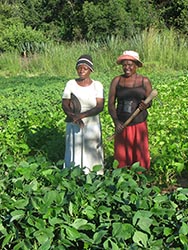 |
|
4 |
| LEGUME Technology expanding in Africa |
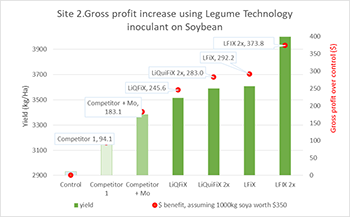 |
Legume Technology are now in final commercial discussion with FarmAg International to begin commercial supply of legume inoculants across Africa. With initial targets in South Africa, Zambia, Malawi, Mozambique, Angola, Tanzania and Uganda we aim to have distribution and sales in many more over the coming 2-3 years. ...
Graph: Results from South Africa where FarmAg placed LEGUMEFiX and LIQUIFiX in independent trials against a major brand in the market
|
|
5 |
| An update on Nitrofix in Malawi |
| AISL begun local production and distribution of Legume inoculant in 2015 following a working arrangement it had with Department of Agricultural Research Services (DARS) in Malawi. From a pilot production of 20,000 sachets in 2015 AISL is now able to produce and sale over 400,000 sachets of legume inoculant. ... |
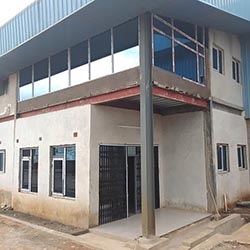 |
|
6 |
| Secondary benefits of strigolactones from legumes to control striga parasitism in Kenyan cropping systems |
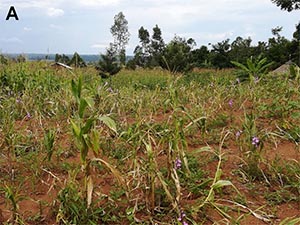 |
The parasitic weed striga (Striga hermonthica) is able to draw nutrients directly from a suitable host plant such as maize through a haustorium, an underground root-root connection. In regions of sub-Saharan Africa (SSA) including Western Kenya, striga can cause up to 70-100% yield loss in fields of maize and other crops... |
|
7 |
| N2Africa publications |
Phenotyping and yield stability studies in soybean (Glycine max (L.) Merrill) under rhizobia inoculation in the savanna region of Nigeria. 2017. PhD thesis by Kehinde Dele Tolorunse
|
8 |
| Reports and other output uploaded on the N2Africa website |
- Stakeholder Consultations Report
- Fourteen MPhil, MSc, MA theses and Internship reports
|
9 |
| Related newsletters |
|
10 |
| Announcement |
|
Feeding a Hungry Planet
How do we ensure a healthy and sustainable diet for our growing world population? How should agriculture adapt – or stay the same – to support the Sustainable Development Goals? The SDG Academy course Feeding a Hungry Planet: Agriculture, Nutrition and Sustainability, relaunching February 11, 2019, on edX, tackles these questions and more. ...
|
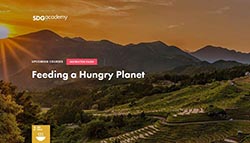 |
|
11 |








